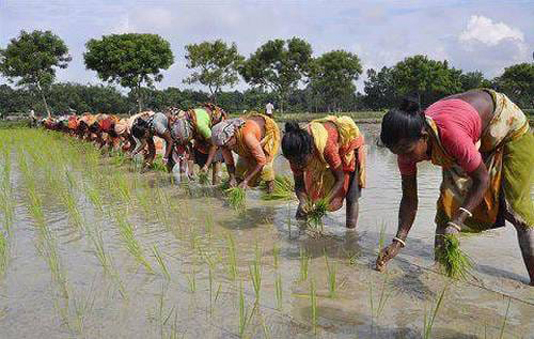RAJSHAHI, Jan 12, 2019 (BSS)- Department of Agriculture Extension (DAE) has
set a target of producing 33.17 lakh tonnes of Boro rice from 8.11 lakh
hectares of land in eight districts of Rajshahi division in the current
season.
To this end, the DAE has fixed the target of bringing 41,838 hectares of
land under seedbed preparation activities, SM Mustafizur Rahman, Additional
Director of DAE, told BSS today.
The marginal farmers were provided necessary fertilizers like Di-ammonium
Phosphate (DAP) and Murat of Potash (MoP) as incentives to facilitate smooth
Boro paddy farming.
Agriculturist Rahman said steps have been taken to ensure smooth Boro rice
cultivation this season. The farming is going on in full swing across the
region as they are optimistic of harvesting the crop early, he added.
Meanwhile, the farmers have started transplantation of Boro paddy seedling
to make the intensive farming programme of the major cereal crop successful
in the current season.
“I have already cultivated Boro on two bighas of land this season”, said
Lokman Hossain, a farmer in Mohadebpur upazila, adding, “I will bring some
six bighas of land under the farming within a very short time.”
The DAE has distributed some 20 kg seeds of Boro rice, 20 kg DAP and 10 kg
MoP fertilisers free of cost to each farmer.
President of Water Management Association of Paba Nurul Amin said, “The
farmers of my area are now busy in Boro cultivation. I am cultivating Boro on
six-bigha of land when I cultivated only three-bigha last year.
Abdullah Heel Kafi, Regional Agriculture Information Officer, says the DAE
and other agriculture-related organisations, Power Development Board and
Rural Electrification Board are ensuring smooth supply of seed, fertilisers
and electricity to the farmers to ensure smooth Boro paddy cultivation.
Kafi expected that the farmers would largely adopt conservation agriculture
technologies in farming Boro paddy to increase its output reducing lifting of
underground water, saving electricity and improving environment.
He added that the farmers were imparted training on how to adopt
conservation agriculture technologies like Alternate Drying and Wetting
irrigation method at a larger scale while farming Boro paddy to save
irrigation water for increasing Boro paddy output at reduced costs.



